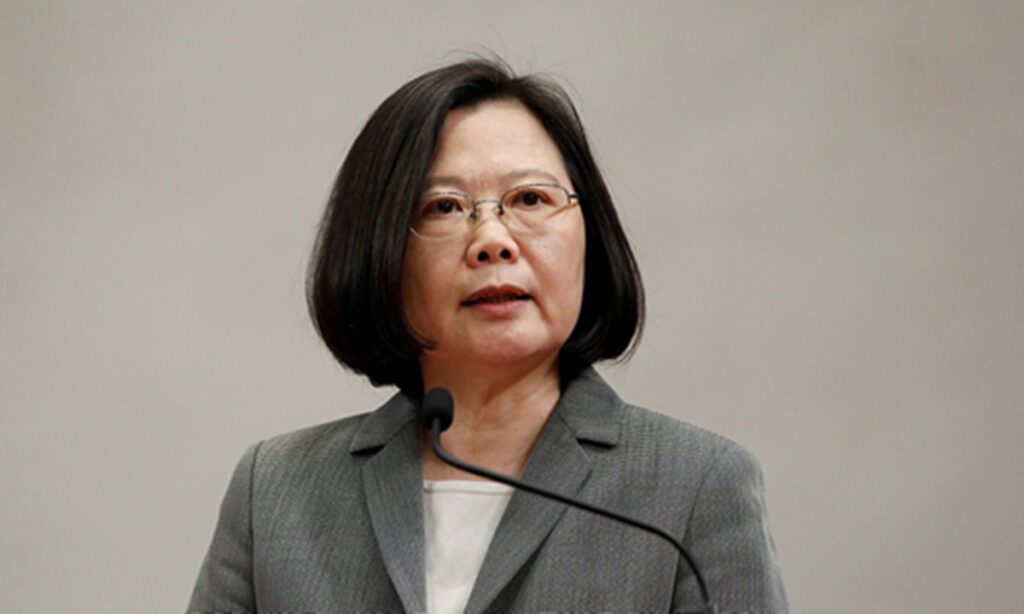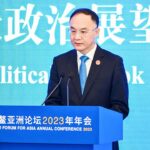China strongly protested and condemned the US on Thursday for having arranged a transit through the US for the regional leader of the Taiwan island in total disregard of China’s solemn representations and repeated warnings, as Tsai Ing-wen has arrived in New York and was scheduled to attend a think tank event and meet US officials.
The stopover also drew strong protests among Chinese nationals, who called Tsai a “traitor of the nation” outside the hotel where she was staying in Manhattan. Some experts also warned that if the US does not properly handle the transit, as Tsai plans to meet US house speaker Kevin McCarthy in California on her way back to Taiwan, it would result in severe consequences for the already strained US-China relations and affect the high-level interactions between Chinese and US officials.
In response to the question about Tsai has met with Taiwanese diaspora and delivered remarks while transiting through the US, Mao Ning, spokesperson of the Chinese Foreign Ministry, said on Thursday that China firmly opposes any form of official interaction between the US and the Taiwan region, firmly opposes any visit by leader of the Taiwan region to the US in any name or under whatever pretext, firmly opposes the US government having any form of official contact with the Taiwan region.
“In disregard of China’s strong démarches and repeated warnings, the US insisted on arranging the so-called ‘transit’ for Tsai Ing-wen to go to the US. China strongly protests and condemns that,” the spokesperson said.
According to media reports, Tsai will attend a banquet with some people from Taiwan in New York and an event on Thursday with the Hudson Institute, a conservative American think tank that has provided platforms for politicians such as former US vice president Mike Pence and die-hard anti-China figures like former US secretary of state Mike Pompeo and Miles Yu.
Outside the hotel in New York where Tsai is staying and along the streets in Manhattan, groups of Chinese nationals staged a protest by waving Chinese national flags in opposition to Tsai’s stopover. Some held banners saying “Selling out Taiwan is national sin” and “Tsai is a big traitor of China.” Members of the US group Center for Political Innovation also spoke out against her Tsai’s, saying “We need money for jobs and infrastructure in America. No more weapons to Taiwan.”
By using the excuse of a “transit,” the US is colluding with Taiwan and arranging for Tsai to engage in political activities in the US in an attempt to upgrade the official contacts and relations between the US and the island, which violates the one-China principle and the three joint communiqués between China and the US, Mao said.
It also severely damaged China’s sovereignty and territorial integrity, sending the wrong signal to “Taiwan independence” separatists, which again proved that the fundamental cause of escalating tensions in the Taiwan Straits is the DPP authorities seeking “Taiwan independence” by colluding with the US and some people in the US seeking to contain China by playing “the Taiwan card,” the spokesperson said.
The Chinese Consulate General in New York also issued a statement on Thursday condemning the transit. “The US connives and supports relevant acts of the Taiwan authorities, strengthens official interaction with Taiwan and upgrades its substantive exchanges with the region, which impacts the political foundation of China-US relations,” the consulate said.
“Tsai’s visit could lead to another serious confrontation in China-US relations,” Xu Xueyuan, the chargés d’affaires in the Chinese Embassy in the US, was quoted as saying in media reports.
It’s pretty clear that the US government and the US Congress will use Tsai’s transit as an occasion to show support and sympathy to the “Taiwan independence” separatists, and use the occasion of Tsai’s meeting with McCarthy to further ease restrictions on official contacts between the US and Taiwan, Zhu Feng, executive dean of the School of International Studies under Nanjing University, told the Global Times on Thursday.
“The US should not let the transit become an excuse to fuel the fire of cross-Straits relations or use the event to advance its ‘one China, one Taiwan’ policy,” Zhu said. “But for the moment, the overall attitude of the Biden administration remains low key.”
Impact on China-US relations
While Reuters said as many as 20 or more US lawmakers planned to accompany McCarthy for his meeting with Tsai, it remains unknown if any officials from the White House would meet her, which has become an important point to be watched in evaluating the consequences of Tsai’s transit through the US.
Especially, the US government has learned lessons from the unprecedented countermeasures in both diplomacy and military terms that China took in response to former house speaker Nancy Pelosi’s provocative visit to Taiwan in August 2022, Wu Xinbo, dean of the Institute of International Studies at Fudan University, told the Global Times on Thursday.
“The US side has to remain restrained and avoid further provoking China on the matter. But if she [Tsai] meets McCarthy, it’s still a serious matter against which China will resolutely fight back, and some high-level interactions between China and the US could be postponed,” Wu said.
The White House said Wednesday that Secretary of State Antony Blinken still wants to visit China after postponing a trip last month amid rising tensions with Beijing, the USA Today reported.
The US also has been in discussions with Chinese officials about a possible trip to Beijing by Treasury Secretary Janet Yellen and Commerce Secretary Gina Raimondo to discuss economic issues, according to media reports.
“If the US does not properly handle Tsai’s transit and further provokes China, Blinken’s visit could be further postponed,” Wu said.
It is also possible that no high-level US officials meet Tsai during her transit as Washington has to think carefully about the consequences, while the US will continue manipulating the Taiwan question, which would only further lower its credibility on its China policy, some experts said.
“In the long run, when the US deals with China, it will seek to maximize its own interests. On the one hand, it asks for help from China when it needs cooperation, and on the other hand, it continues playing the ‘Taiwan card’ to challenge our bottom line,” Wu said.
(Global Times)




